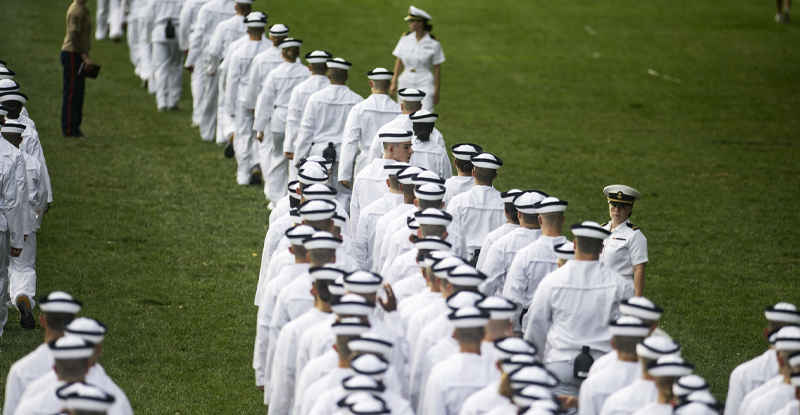Note on this article by Scott McQuarrie, USMA ’72:
The article highlights one of USNA’s many workarounds they used for 4 years until the FY 2024 NDAA forced them to resume using standardized test scores in the candidate composite score calculation (the WPM is supposed to be used to ascertain order of merit that the statutes require be used in two appointment categories).
Not considering standardized test scores makes weak candidates appear stronger in relation to stronger candidates when compared by candidate composite score (at USNA, WPM).
For the class of 2029, USNA reverted to using standardized test scores in calculating their WPM, but they consciously underweight them (only 18% Math, 10% Verbal, of overall weighting of the composite score) again, as a workaround.
USMA’s formula has for years weighted standardized test scores at 46% (total) of the total candidate composite score. USAFA also underweights standardized test scores in its formula, but not as much as USNA does.
You would think that the more technical services that have nuclear subs, missiles, sophisticated aircraft, et al, and thus a need for intellectually strong people, would put at least as much emphasis on “intellectual capacity” as does USMA. They don’t.
By Victoria Manning | Restoration News
United States military service academies have historically been among the most competitive and highly esteemed colleges in the nation.
Yet since at least 2021, service academies have lowered admission standards to accommodate identity-based goals such as race and gender. The U.S. Naval Academy (USNA), for example, told applicants their standardized test scores counted as a consequential part of admissions determination.
Court evidence proves otherwise.
Shocking Evidence Presented in Court
In 2023, Students for Fair Admissions (SFFA) sued the USNA to stop its race-based admissions policies. A federal district court ruled against SFFA, allowing USNA to continue considering race—a practice to which USNA had admitted—when making admissions decisions. S
FFA had filed an appeal when President Trump and Defense Secretary Hegseth prohibited consideration of race in service academy admissions. Therefore, the lawsuit became moot, and on June 16, 2025, SFFA and the Justice Department filed a joint motion to dismiss the suit and to vacate the district court’s decision. Vacating the lower court’s ruling would nullify it, eliminating its precedential effect.
Restoration News reviewed evidence presented at trial proving USNA did not weight standardized test scores at all in their admissions process for applicants for the classes of 2025-2028. Here is an excerpt:
USNA stated in official Defense Department memos that it would give consideration to SAT scores.
A Marine Corps memo in 2021 indicated applicants for the class of 2026 at USNA should aim for certain target scores on the SAT or ACT. Another memo issued in 2022 by the Navy Secretary for the class of 2027 indicated students “should aim to score above 500 in reading and above 550 in math, with a combined minimum of 1050,” for the SAT.
Abundant evidence demonstrates that standardized test scores provide the most reliable measure of intellectual ability used in college admissions. These scores hold extra weight when used to compare candidates competing for academically challenging programs.
Applicants for the classes of 2025-2028 were misled into believing their performance on these standardized tests mattered. It’s disgraceful that these aspiring military officers who desire to serve their nation would be treated so deceitfully.
Restoration News spoke to the mother of a student who applied for admissions to USNA in 2021 for the class of 2025. The student had both Presidential and Congressional nominations, standardized test scores far higher than the recommended minimums, top 10 in his large high school class, star athlete, family history of honorable military service, and more. The problem—he was a white male—so he was rejected.
The mother was shocked to learn his SAT scores were not considered. She told Restoration News:
“My son worked hard in high school to do everything he could to fulfill his dream of attending the Naval Academy, including achieving a high score on his SAT. To now find out that USNA didn’t even use his SAT score as a factor when comparing applicants for admission and that he was most likely rejected because of his gender and skin color is sickening.”
The mother said her son shared concerns about checking a box for “race” when completing his application. She instructed him to leave that portion unfilled, but he pointed out that USNA required a photo with the application. That’s likely how USNA confirmed the skin color of applicants.
Merit Matters
Military academies exist to train warriors to lead troops into battle. Instead, ideologues at USNA have invented workarounds to circumvent merit. They still remain in place, and have attempted to turn these esteemed institutions into social justice camps.
Gender and race do not play a role on the battlefield—pitting service members against one another based immutable traits only divides rather than unite. Survival depends on the best leaders of soldiers, airmen, sailors, and Marines our country can find—no matter race or gender.
“Character and intellect” are the basic ingredients the academies should be looking for in candidates, as explained by Army Brigadier General Lance Betros (Ret.) in his book Carved from Granite. Military leadership requires high level critical thinking skills, especially in ambiguous and rapidly evolving combat situations.
Choosing military leaders using practices that circumvent accurate measures of intellect harms national security and endangers the lives of troops on the battlefield.
This is why we launched RestoreTheMilitary.com, where we detail the leaders who have pushed hardest to eliminate merit-based advancement in the military.
Those responsible for endangering our military through non-merit-based admissions systems rather than choosing the best qualified future officers based on merit should be identified and fired. For example, the longtime USNA Dean of Admissions, Stephen Bruce Latta, who oversaw these non-merit-based admissions is still in charge.
Congress must take decisive action to solidify merit-based academy admissions into law—eliminating workarounds such as improper or non-weighting of standardized test scores.
First published on Restoration News








Leave a Comment